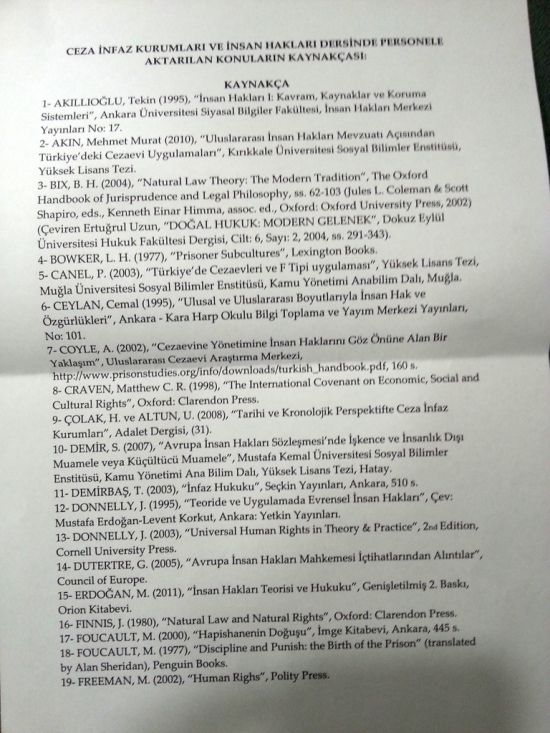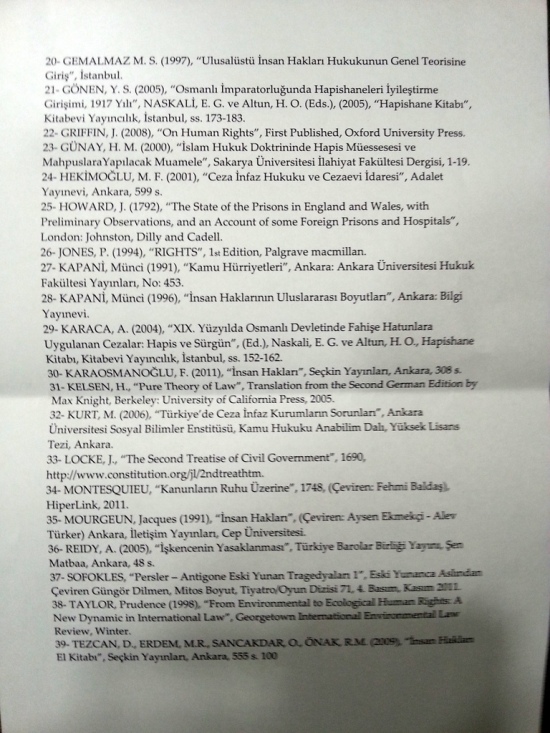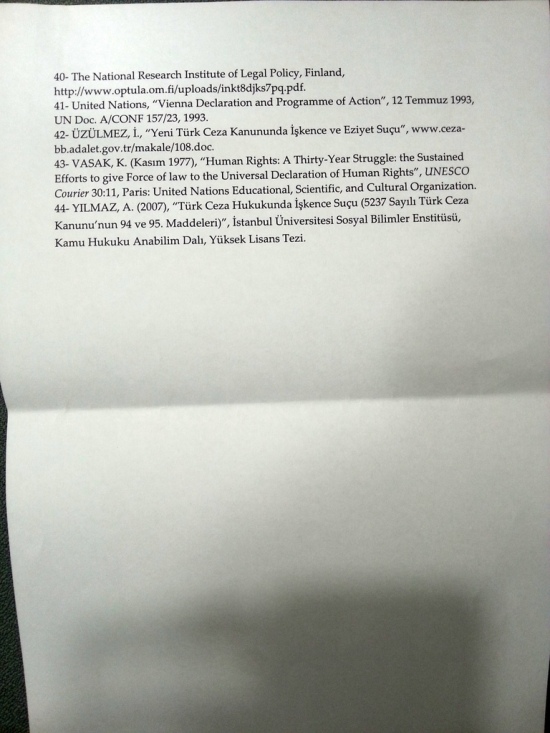09/01/2015 | Writer: Murat Köylü
Turkish Ministry of Justice responded to a request for information regarding LGBT inmates.

Turkish Ministry of Justice responded to a request for information regarding LGBT inmates and said that it provides training on how to approach LGBT convicts and detainees to the prisons’ psycho-social service experts. The Ministry did not respond to the question on whether correctional officers and the general inmate population receive programs on awareness-building and violence prevention.
The Ministry had said “We do not do any work on LGBT rights”
The Ministry of Justice sent a partial answer to Mahmut Tanal’s request for information regarding “LGBT rights in prisons”. Mahmut Tanal is a member of the Grand National Assembly of Turkey’s Human Rights Commission.
The Ministry of Justice had answered that they do not conduct “any work on LGBT rights”, in response to another request for information by Parliamentarian Tanal. However, it has been revealed that the Ministry is in fact giving trainings on the issue to the prison psycho-social service experts.
Isolation instead of education!
The European Court of Human Rights had found Turkey guilty of discrimination and ill-treatment in a 2012 case regarding a gay inmate’s “isolation for his own security.” In the following months of the judgment, the Ministry of Justice had put forth an “LGBT-only Prison”, which was criticized by civil society as “collective isolation”.
Mahmut Tanal, Member of Parliament from the Republican People’s Party, submitted a parliamentary question in November 2014 to the Minister of Justice Bekir Bozdag on “LGBT inmates rights”. However, given the fact that questions submitted by opposition parties usually go unanswered, the same questions were submitted to the Ministry through a request for information, which makes a response mandatory.
The questions submitted by MP Tanal are:
- Are there any occupational trainings regarding the problems and special needs of lesbian, gay, bisexual, and trans detainees and convicts given to correctional officers, teachers, social workers, psychologists, sociologists, and health personnel working within the prison system?
- In the recruitment process for the aforementioned personnel, are there any criteria requiring knowledge and experience that are to be met on LGBT persons’ human rights and special needs?
- Are there any awareness-building and violence prevention programs given to correctional officers and other inmates on combating stereotypes based on sexual orientation and gender identity, exclusion and violence?
LGBT training to psycho-social staff by Ministry of Justice
The Ministry’s response to these questions are:
“Within the Technical Support Project on Improving Mental Health and Addiction Services in Prisons that is supported by the the European Union, training is provided to psychologists and social workers who are employed in the prison system about the principles of approaching LGBT convicts and detainees and about proper procedures of observing, dispatching, and intervening in problematic sexual behaviors (paraphilia); additionally, training is provided to all personnel working in the prison system on how to approach such detainees and convicts. In this scope, 25 psycho-social service personnel have been given educational training and 450 experts have been given generalization training.”
The question on awareness-building and violence prevention programs given to correctional officers and other inmates was not answered.
“Cruel, inhuman, and degrading acts were outlawed”
Mahmut Tanal also asked the following question: “Does your Ministry follow any procedures to penalize correctional officers or other inmates who threaten or inflict violence to LGBT individuals? Does your Ministry act to protect LGBT individuals in these cases? Are there any mechanisms in the prison system for LGBT inmates to ease the process of filing complaints and to ensure their privacy and safety?”
The Ministry responded in a general way:
“In all our prisons, all security precautions related to the execution of punishment and security precautions are conducted without discrimination based on the convicts’ race, language, religion, sect, sex, birth, philosophical belief, national or social roots, political or other views, or economic means and other social status issues and without providing any privilege to anyone. In the execution of punishments and safety precautions, cruel, inhuman, and degrading acts have been outlawed and contrary behaviors are considered criminal.”
“All prisons operate under Law No: 5275 on the Execution of Penalties and Security Measures and relevant decisions. All convicts and detainees have the right to complain to the penal judge or the court of aggravated crimes regarding their treatment by the institution.”
“Furthermore, all complaints by convicts and detainees are concluded with urgent judicial and administrative enquiries. It is ensured that all convicts and detainees who declare that they are LGBT benefit from the same rights given to all convicts and detainees in the prison system without discrimination.”
The Ministry’s human rights curriculum of 44 books
The ministry responded to MP Tanal’s question, “what are the sources and publications used for the relevant personnel’s occupational training on human rights and democratic citizenship?”, with a bibliography containing 44 entries, titled “Bibliography for the Topics Covered for the [Prison] Staff in the Course titled Penal Institutions and Human Rights Education”[3]:
- Tekin Akıllıoğlu (1995), “Human Rights I: Concepts, Resources, and Protection Systems”
- Mehmet Murat Akın (2010), “Prison Practices in Turkey in the Context of International Human Rights Legislation” (Graduate Thesis)
- Brian Bix (2004), “Natural Law Theory: The Modern Tradition”
- L. H. Bowker (1977), “Prisoner Subcultures”
- P. Canel (2003), “Prisons in turkey and the F-Type Prisons” (Graduate Thesis)
- Cemal Ceylan (1995), “National and International Perspectives on Human Rights and Freedoms”
- Andrew Coyle (2002), “A Human Rights Approach to Prison Management: Handbook for Prison Staff”,http://www.prisonstudies.org/sites/prisonstudies.org/files/resources/downloads/turkish3.pdf (via http://www.prisonstudies.org/country/turkey)
- Matthew C. R. Craven (1998), “The International Covenant on Economic, Social and Cultural Rights”
- H. Çolak and U. Altun (2008), “Prisons from a Historical and Chronological Perspective”
- S. Demir (2007), “Torture and Inhumane Treatment or Humiliation in European Convention on Human Rights” (Graduate Thesis)
- T. Demirbaş (2003), “Criminal Execution Law”
- J. Donnelly (1995), “Universal Human Rights in Theory and Practice”
- J. Donnelly (2003), “Universal Human Rights in Theory and Practice”, 2nd Edition[1]
- G. DuTertre (2005), “Quotations from the European Court of Human Rights Opinions”
- M. Erdoğan (2011), “The Jurisprudence and Theory of Human Rights”
- J. Finnis (1980), “Natural Law and Natural Rights”
- Michel Foucault (2000) [sic], “[Discipline and Punish:] The Birth of the Prison”
- Michel Foucault (1977), “Discipline and Punish: The Birth of the Prison”[1]
- M. Freeman (2002), “Human Rights”
- M. S. Gemalmaz (1997), “Introduction to the General Theory of Transnational Human Rights Law”
- Y. S. Gönen (2005), “The Ottoman Empire Attempts to Rehabilitate Prisons in 1917”
- J. Griffin (2008), “On Human Rights”
- H. M. Günay (2000), “The Prison Enterprise and The Treatment of Prisoners in Islamic Law Doctrine”
- M. F. Hekimoğlu (2001), “The Criminal Execution Law and the Management of Prison”
- J. Howard (1792), “The State of the Prisons in England and Wales, with Preliminary Observations, and an Account of some Foreign Prisons and Hospitals”
- P. Jones (1994), “Rights”
- Münci Kapani (1991), “Public Freedoms”
- Münci Kapani (1996), “International Dimensions of Human Rights”
- A. Karaca (2004), “Penalties against Prostitute Dames in the Ottoman Empire in the 19th Century: Imprisonment and Exile”
- F. Karaosmanoğlu (2011), “Human Rights”
- H. Kelsen (2005), “Pure Theory of Law”
- M. Kurt (2006), “The Problems of Turkey’s Prisons” (Graduate Thesis)
- John Locke (1690), “Second Treatise of Civil Government”
- [Charles-Louis de Secondat, Baron de La Brède et de] Montesquieu (1748), “De l’Espri des Lois [On The Spirit of the Laws]”
- Jacques Mourgeun (1991), “Human Rights”
- A. Reidy (2005), “On the Ban of Torture”
- Sophocles (441 BCE), “Antigone” [translated from the Ancient Greek source text by Güngör Dilmen in “Ancient Greek Tragedies I / Persians / Antigone”]
- Prudence Taylor (1998), “From Environmental to Ecological Human Rights: A New Dynamic in International Law”
- D. Tezcan, M. R. Erdem, O. Sancakdar, R. M. Önak (2009), “The Human Rights Handbook”
- The National Research Institute of Legal Policy, Finland,http://www.optula.om.fi/uploads/inkt8djks7pq.pdf [sic; see footnote 2]
- United Nations (1993), “Vienna Declaration and Programme of Action”
- İlhan Üzülmez (n.a.), “the Crimes of Torture and Mistreatment in the New Turkish Penal Code”, http://www.ceza-bb.adalet.gov.tr/makale/108.doc [in Turkish]
- K. Vasak (1977), “Human Rights: A Thirty-Year Struggle: The Sustained Efforts to Give Force of Law to the Universal Declaration of Human Rights”
- A. Yılmaz (2007), “The Crime of Torture in Turkish Penal Law (Articles 94 and 95 of the Turkish Penal Code no. 5237)” (Graduate Thesis)
[1] The entry is duplicated in the original bibliography document submitted by the Ministry because both the Turkish translation and the scholarly source text were cited.
[2] Improper citation in the source text and web page not found (404) in the link provided by the Ministry. For research reports available from The National Research Institute of Legal Policy, seehttp://www.optula.om.fi/en/index/researchreports.html
[3]



Translation: LGBTI News Turkey
Tags: human rights

